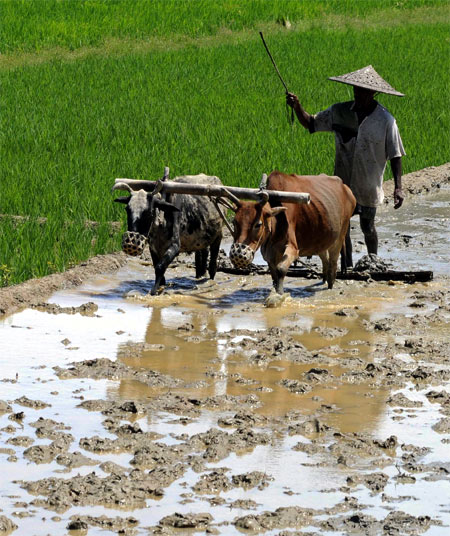
Amid forecast of deficit rains this month, the government on Tuesday asked farmers not to panic as contingency plans are put in place to handle any adverse impact of a possible poor monsoon on kharif crops.
Long before the monsoon set in, predictions about monsoon have been doing the rounds.
The Indian Meteorological Department had come out with a dismal prediction that the southwest monsoon this year would be below normal, sending farmers in a tizzy as they are dependent on the Rain God for their livelihood.
Kolkata-based weatherman Angshujyoti Das, who makes a living out of selling weather forecasts, had a different tale to tell.
In an interview to rediff.com in May, Das had categorically stated that monsoon this year would not be deficient.
He suggested that to get rid of confusion, there should be one comprehensive and credible prediction of monsoon for India since a major part of the economy is dependent on it.
Monsoon rains are crucial as 55 per cent of cultivable land still doesn't come under irrigation.
"So far, monsoon rains were better than expected although there is a forecast of deficit rains this year too.
“Farmers need not panic. We are ready with contingency plans to tackle any possible impact of poor rains on kharif crops," Agriculture Minister Radha Mohan Singh said while addressing state ministers on food inflation in New Delhi.
Backing up his assurance, he spoke of the government's long history of handling a poor monsoon situation as ‘there is nothing to fear as of now’.
"There was a drought-like situation last year, and sowing area was down 2 per cent because of 12 per cent deficit rains.
“We took effective measures to bring down the damage on crops.
“We are prepared for this year as well. However, I feel that situation will not be that bad," he said.
The minister's words were somewhat similar to the statements made by Harsh Vardhan, the Union science and technology minister, in April.
In an interview to rediff.com, Vardhan had said, "Scientists have divided the probability factors in five categories.
"The probability of deficient rainfall is 33 per cent with a rainfall range of 90 per cent.
"The probability of a 35 per cent below normal rainfall with a rainfall range of between 90 and 96 per cent.
"The probability of a normal monsoon is 28 per cent with a rainfall range of 96 and 104 per cent while the probability of above and excessive rainfall is negligible."
In a recent column in Business Standard, Subir Gokarn wrote: 'A deficient monsoon puts major crops like pulses, oilseeds, cotton and cattle fodder at risk.
'In 2009, below-normal rainfall had a significant impact on the prices of pulses.'
Farmers are, however, hopeful of tiding over the monsoon woes with a mix of crop diversification and increased machine use.
They also expect higher government-announced minimum support prices.









